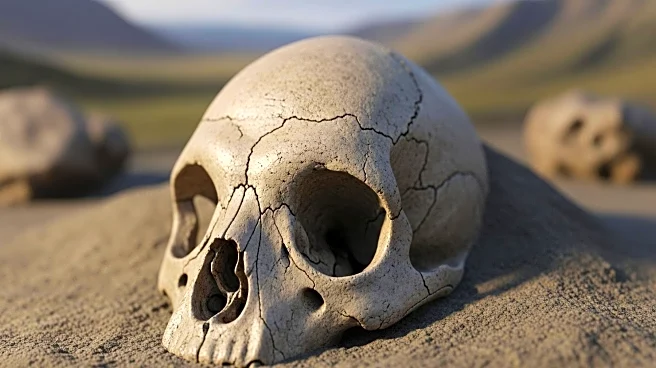What's Happening?
A human skull discovered in Hubei province, China, has been digitally reconstructed to reveal it is approximately 940,000 to 1.1 million years old. The skull, known as Yunxian 2, does not match classic Homo erectus but is linked to a sister lineage associated with Denisovans and Homo longi, also known as 'Dragon Man.' This finding suggests that human lineages diverged much earlier than previously thought, potentially altering the timeline of human evolution. The discovery ties into recent findings that the Harbin 'Dragon Man' skull is a Denisovan, indicating that Yunxian 2 and Dragon Man belong to the same Asian hominin branch.
Why It's Important?
The discovery of Yunxian 2 has significant implications for understanding human evolution. It challenges existing timelines by suggesting that modern humans may have emerged 400,000 years earlier than current fossil records indicate. This finding could reshape theories about the divergence of human lineages and the origins of Homo sapiens. The research highlights Asia's crucial role in human evolution, suggesting that early Asian populations may have influenced the gene pool of later humans. The study also emphasizes the need for further verification and additional evidence to fully understand the implications of this discovery.
What's Next?
Further research and analysis are needed to confirm the findings and explore the broader implications of the Yunxian 2 skull. Scientists may seek additional fossils and conduct more detailed studies to verify the timeline and lineage connections. The discovery could prompt a reevaluation of human evolutionary history and lead to new insights into the origins of Homo sapiens.
Beyond the Headlines
The discovery of Yunxian 2 contributes to the ongoing debate about human origins, particularly the Out-of-Africa versus multiregional evolution theories. It suggests that multiple human species branched early on, with Asia playing a significant role in shaping human evolution. The findings highlight the complexity of human evolution and the need for a nuanced understanding of how different lineages contributed to the development of modern humans.









